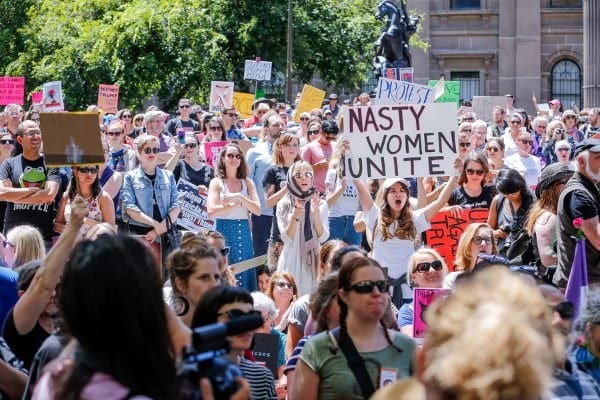These were some of her observations in an article responding to the concerns many of us share about the government funding couples counselling in the context of domestic and family violence under the National Plan to Reduce Violence Against Women and Their Children.
Arndt’s article was published in the Spectator at around midday on the 29th of July, which was the day I was running around Parliament House taking meetings with anyone who would listen. It was before the Senate Motion introduced by Larissa Waters was passed, calling on the government to ensure survivors of violence are not forced to undergo couples counselling, to put in place standards for working with people who use violence, and to adequately fund specialist services for survivors.
Arndt called on people to lobby the government on the issue providing direct links to the Prime Minister and relevant Minister’s offices in an effort to “rein in” the feminists.
She cited a 2008 research paper written by the Marriage and Therapy Program at Kansas State University and Virginia Tech, and a meta-analysis published in the Journal of Marriage Family Therapy to argue that couples counselling is both safe and effective.
Notwithstanding the former only referred to “experimental studies and clinical practices of conjoint treatment” and the latter acknowledged that “there has been little research on when this type of treatment is appropriate and advisable”.
This latter study went down the rabbit hole of trying to classify certain “couple violence” as “situational” and looks to evidence of the success of couple therapy in addressing a wide range of other issues, such as “conflict management” and “sexual problems” to justify the conclusion that “there is reason to believe that couple therapy may provide an integral tool for treating situational violence among couples who do not wish to separate.”
(My emphasis added.)
The conclusions from the meta-analysis component of the study reveal the biases of the research perspectives, for example:
“[I]t is undeniable that certain issues associated with situational couple violence are more effectively addressed with both partners present, so that the couple can grow stronger attachment bonds and support one another through the process.”
Arndt goes on to assert that the government should come to its senses and ignore the “male bashing feminist industry” by implementing its policy in support of couples counselling in domestic violence.
So, where does all this fear for “ferocious” feminists come from?
Ninety-five percent of all victims of violence (women or men) experience that violence from a male perpetrator, yet the idea that feminists hate men, or are out to “bash” them, remains popular.
It is the opposite. At Women’s Safety NSW we have come to understand, after working for many years on the coalface of domestic, family and sexual violence, that men too are not benefiting from a society governed by patriarchal rules.
The rules which state that men and boys should be strong, stoic and dominant and women and girls should be kind, caring and gracious don’t help men or women.
Men and boys who do not fit the hyper-masculine stereotype fall prey to the more dominant men around them, which too often causes them to feel humiliated, disempowered and inadequate. It’s a lonely, isolating place to be.
For women and girls in the lives of men struggling with these pressures, it can be terrifying. Investigative journalist, Jess Hill calls this “humiliated fury” – men who feel humiliated by not being in control hitting out at the women and children in their lives.
Feminists don’t want to “bash” men. More often they want to support men to be their whole selves, just as we do for women and girls and non-binary people. We want men to be free to express their full range of emotions without fear of being ridiculed. We want them to have deep, intimate, emotional connections with the people they love; to be able to enjoy relationships of equal power without being the subject of mockery.
This, we believe, would benefit everyone. Yes, women and children would be much safer, but so would men.
The men’s behaviour change programs that we in the sector have been promoting in place of interventions like couples counselling do just this. They provide a genuine opportunity for men to reflect upon their lives and how their values, thoughts and actions are impacting upon their relationships and the people they love.
At a deeper level, they provide an opportunity for men to consider a different way to be in the world, and so many men who engage with these programs report profound changes to their own feelings of self-worth as men and better communication and deeper relationships with those that they love as a result.
And do we want equal rights for women and girls? Hell yeah! But isn’t that fair enough? Why shouldn’t we want our daughters to have the same rights and opportunities, and the same sense of safety as our sons?


